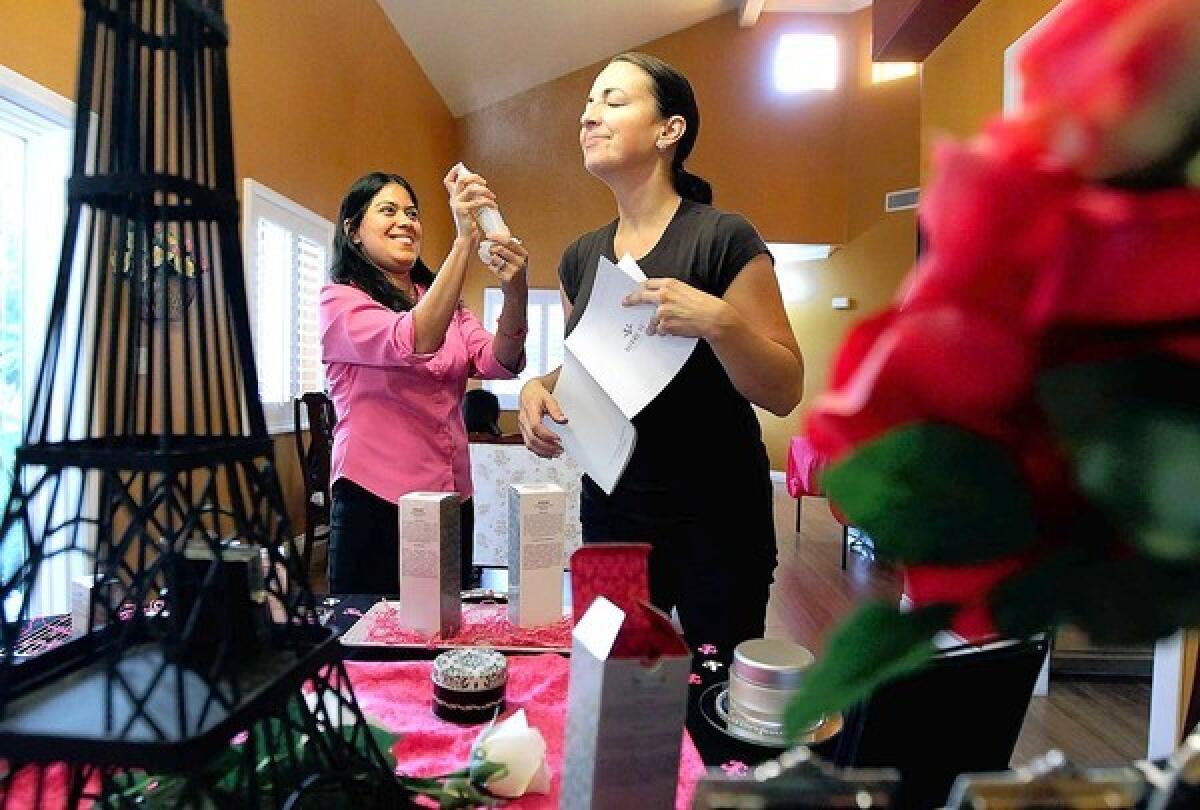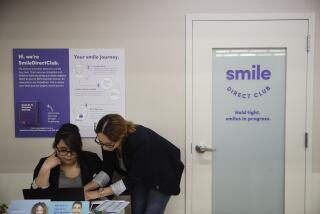Direct-sales cosmetics 2.0

- Share via
The world of direct-sales cosmetics is in a state of transition. You might remember Avon’s door-to-door saleswomen or Mary Kay cosmetics from times past. But in the last few years, the industry has grown rapidly to include organizations that market via Facebook and Twitter, products that are available only on the Internet and incentives that leave Mary Kay’s pink Cadillac prizes in the dust.
Votre Vu, a Chicago-area company that sells products containing ingredients sourced in France, uses, in addition to parties, Twitter and iPhone applications to move merchandise. Mark., a line from Avon that is geared toward women 18 to 34, uses Facebook and iPhone applications as well as e-boutiques and celebrity endorsements. And Mary Kay cosmetics,arguably the most recognizable brand in direct-sales cosmetics, has a 1-year-old Facebook page that has attracted more than 300,000 fans who engage in online polls and makeover contests and watch YouTube streamed videos about new products. The cosmetic brand’s page also links to eight other Facebook pages, including Mary Kay cosmetics in the Philippines, Hong Kong, Spain and Canada.
As always, direct-sales companies use incentive programs that award high-end items such as trips and cars to top achievers. There is, of course, the iconic pink Cadillac gifted to top sellers for Dallas-based Mary Kay. About 1,500 Mary Kay salespeople are driving a pink Cadillac, and for those who wonder what it takes to get that perk, a Mary Kay salesperson qualifies by reaching $90,000 in annual sales. High-earning salespeople for Tustin-based botanical skin-care line Arbonne receive a one-year lease on a white Mercedes of their choice; the top 10 sellers earn trips to France.
Cosmetics and skin-care products marketed through direct sales typically use representatives, or “brand ambassadors,” who sign up and pay a fee for a starter kit of products that they in turn sell to friends and acquaintances, and, eventually, a wider network of people. These salespeople aren’t salaried; rather, they receive a commission (generally 30%) based on their overall sales. As they sign on new salespeople to the brand, they typically receive additional commissions based on the sales of their recruits or, collectively, their “team.”
It’s a concept that has flourished in recent years, despite being slightly down during the major economic slump. Direct sales in the United States accounted for $28.33 billion in 2009, down slightly from $29.6 billion in 2008, with personal-care products, cosmetics and skin care accounting for 21% (about $5.9 billion) of the total, according to the Direct Selling Assn., a trade group. (For a look at a direct-sales jewelry operation, please see accompanying story.)
Executives of direct-sales companies say it is their ability to control the product, branding and customer experience that creates loyalty among shoppers.
Companies must keep their products visible and competitive in a crowded market. Many are attempting to do so by implementing beauty buzz words and exotic branding. Votre Vu uses French terminology for products such as Le Sorbet (an anti-aging serum delivered in dry ice that is the company’s highest-priced item at $160) and elegant silver and white packaging. That, combined with the Frenchprovenance, a hand-stamped wax seal and building on what Chief Executive Harold Zimmerman calls the French philosophy of skin care (he describes it as the use of ingredients with the highest efficacy) can be an alluring idea to those looking for a luxurious brand of French skin care with a price tag that’s less than a jar of Darphin or La Mer, both of which are priced around $250.
Zimmerman also encourages salespeople to utilize social media such as Twitter and Facebook in addition to hosted parties (“soirees”). Brand ambassadors are given tutorials on how to build effective Facebook pages and use iPhone applications. “Someone can be in line at the bank and strike up a conversation with someone. They have the ability to bring up the products on their phone right there and tell someone about the line,” Zimmerman says. But as much as Votre Vu pushes the social-media angle, Zimmerman says the company is careful not to ostracize the nontech-savvy salesperson. “The way we approach technology is if our grandmothers couldn’t use it, then we didn’t do our job making it easy enough.”
For sales representatives and customers of the Avon-owned cosmetic line Mark., buying, selling and marketing through the Internet and social media is probably second nature. The line is geared toward a relatively young demographic and utilizes technology in a way that has transformed the traditional idea of door-to-door sales into “wall-to-wall,” which lets brand representatives reach their network online as well as in person. In 2009, Mark. launched an application on its Facebook page where people connect with brand sales reps from the comfort of their dorm room or home. The company has also created iPhone applications and allows salespeople to design their own e-boutiques to sell remotely and further explain the brand to potential buyers. And for staying up-to-the-minute with new products, people can follow Mark. on the brand’s Twitter feed.
Some medical professionals have taken note of the products that are being marketed with 21st century consumers in mind. Westwood-based dermatologist Dr. Jessica Wu says she is a fan of Proactiv, which is sold both online and in some mall kiosks, and several direct-sales lines, including Avon’s new anti-aging skin-care line, Anew. Many of her patients, she says, no longer buy skin-care products in department stores and consider formulations from Arbonne and Votre Vu and to be just as sophisticated as department products. “I also like that a lot of [direct-sales brands] have really good customer service, which often includes free shipping and a money-back guarantee,” Wu says.






